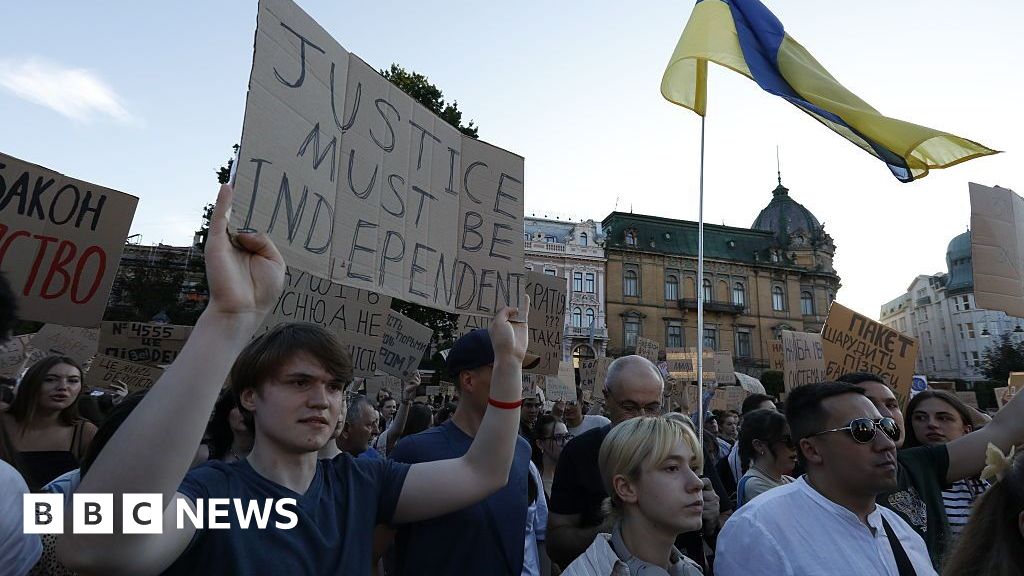生成中...【新闻摘要】
乌克兰总统泽连斯基近日上演了一出"法律变脸秀":先是签署法案将两大反腐机构收归总统麾下,引发全国抗议浪潮,后又紧急撤回法案称要"保障独立性"。这场政治反转剧连欧盟都忍不住插话:"反腐可是入盟核心条件啊!"抗议者们举着标语牌在街头高呼:"总统先生,您这反腐剧本是不是拿反了?"
Zelensky backtracks on law over anti-corruption bodies after protests
泽连斯基在抗议后撤回反腐机构相关法案
The largest anti-government protests since the start of the war took place in Ukraine this week
乌克兰本周爆发了自战争开始以来最大规模的反政府抗议活动
Ukrainian President Volodymyr Zelensky says he has submitted a draft law to reinstate the freedom of two anti-corruption bodies in Ukraine - days after nationwide protests broke out over changes curbing their independence.
乌克兰总统弗拉基米尔·泽连斯基表示,他已提交草案恢复国内两大反腐机构的自主权——此前因限制这些机构独立性的改革引发了全国性抗议。
He said the text of the bill was"well-balanced", but did not provide any details.
他称该草案文本"非常平衡",但未提供任何细节。
On Thursday, Zelensky backtracked, saying the new bill was intended to safeguard the independence of Ukraine's National Anti-Corruption Bureau (Nabu) and Specialised Anti-Corruption Prosecutor's Office (Sap), and to protect them from Russian influence.
周四泽连斯基改口称,新法案旨在保障乌克兰国家反腐局(Nabu)和特别反腐检察官办公室(Sap)的独立性,使其免受俄罗斯影响。
Kyiv's Western partners had also expressed serious concerns over the legislation.
乌克兰的西方合作伙伴也对这项立法表示严重关切。
The law passed earlier this week brought Nabu and Sap under the control of the prosecutor general, who is appointed by the president.
本周早些时候通过的法案将Nabu和Sap置于由总统任命的检察长管辖之下。
At the time Zelensky justified his decision to curtail the bodies' powers by citing Russian influence. The day before, Ukraine's security services had carried out searches and arrests targeting alleged Russian spies at the agency.
当时泽连斯基以俄罗斯影响力为由,为其削弱这些机构权力的决定辩护。此前一天,乌克兰安全部门对该机构内涉嫌俄罗斯间谍的人员进行了搜查和逮捕。
The passing of the legislation instantly sparked the largest protests since the start of Russia's full-scale invasion in February 2022 in several cities across Ukraine, with many worrying the law would severely undermine the Nabu and Sap's authority and effectiveness.
该法案的通过立即引发了自2022年2月俄罗斯全面入侵以来乌克兰多座城市最大规模的抗议活动,许多人担心该法律将严重损害Nabu和Sap的权威与效能。
Thousands of people gathered in streets and squares across Ukraine, holding placards calling for the legislation to be vetoed.
数千人聚集在乌克兰各地的街道和广场,举着要求否决该法案的标语牌。
Several commentators accused Zelensky of democratic backsliding. Their concerns were further exacerbated when Ukraine's Western partners signalled their displeasure with the bill.
几位评论人士指责泽连斯基民主倒退。当乌克兰的西方合作伙伴表达对该法案的不满时,这种担忧进一步加剧。
Ukraine has official EU candidate status and a spokesman for European Commission chief Ursula von der Leyen previously warned Kyiv that the rule of law and the fight against corruption were"core elements" of membership to the bloc.
乌克兰拥有欧盟候选国地位,欧盟委员会主席乌尔苏拉·冯德莱恩的发言人此前曾警告基辅,法治和反腐败是该集团成员资格的"核心要素"。
On Thursday, the Commission said it"welcomed" the Ukrainian government's decision to take action against the bill.
周四,欧盟委员会表示"欢迎"乌克兰政府采取行动反对该法案。
"We are working [with the Ukrainian government] to make sure that our concerns... are indeed taken into account," the spokesman said.
发言人称:"我们正(与乌克兰政府)努力确保我们的关切......确实得到考虑。"
The creation of Nabu and Sap in 2014-15 was one of the requirements set by the European Commission and the International Monetary Fund to move towards a relaxation of visa restrictions between Ukraine and the EU.
2014-15年创建Nabu和Sap是欧盟委员会和国际货币基金组织为放宽乌克兰与欧盟之间签证限制而设定的要求之一。
Opposition MP Oleksiy Goncharenko noted Zelensky's comments that"the independence of anti-corruption institutions must be guaranteed."
反对派议员奥列克西·贡恰连科注意到泽连斯基关于"必须保障反腐机构独立性"的言论。
"First we take it away, and then we say that it must be guaranteed. So why was all this necessary?"
"我们先剥夺独立性,然后又说必须保障它。那这一切折腾到底图什么?"
In his message on social media on Thursday, Zelensky did not acknowledge the protests or the backlash but said it was"important that we respect the position of all Ukrainians and are grateful to everyone who stands with Ukraine."
泽连斯基在周四的社交媒体发言中未提及抗议活动或反对声浪,仅表示"重要的是我们尊重所有乌克兰人的立场,并感谢所有与乌克兰站在一起的人"。

